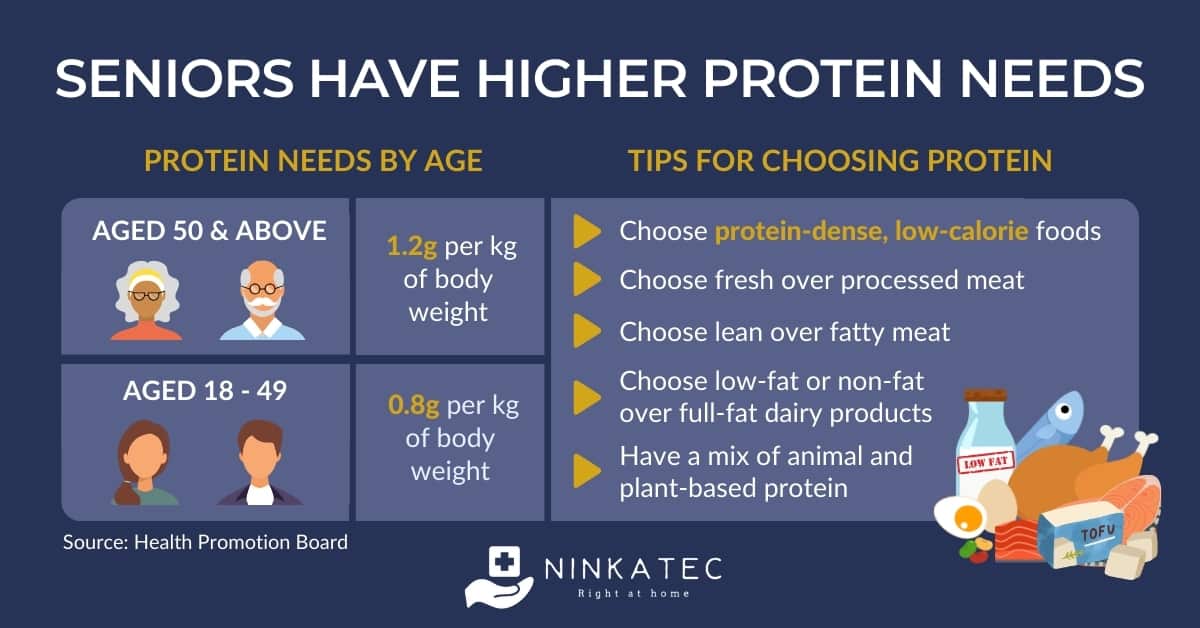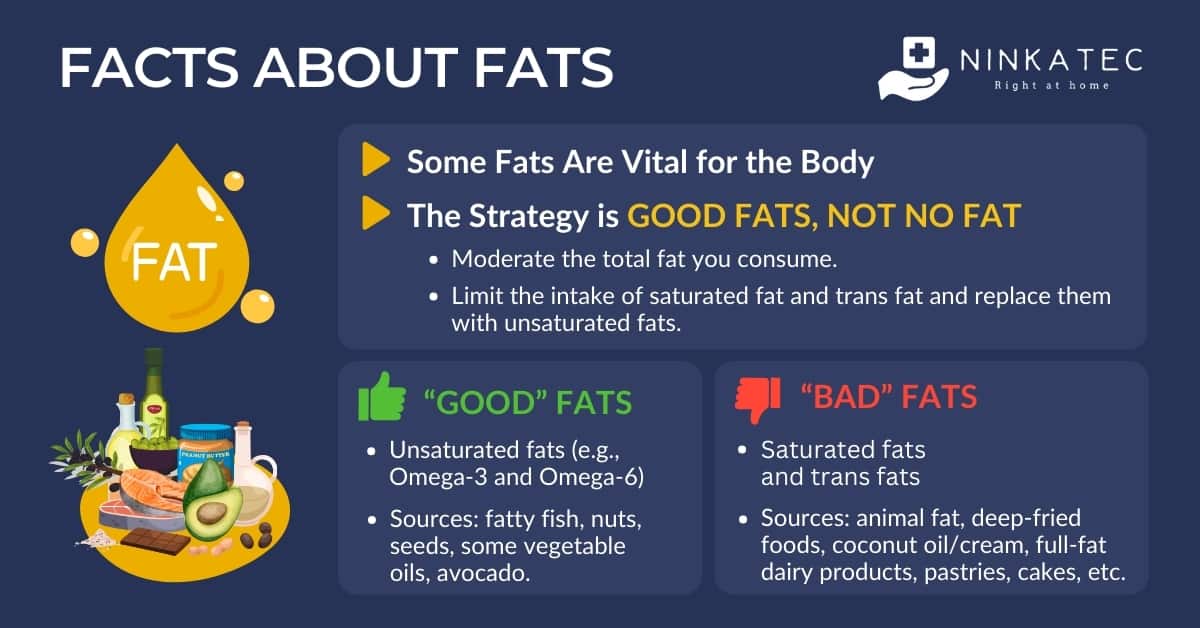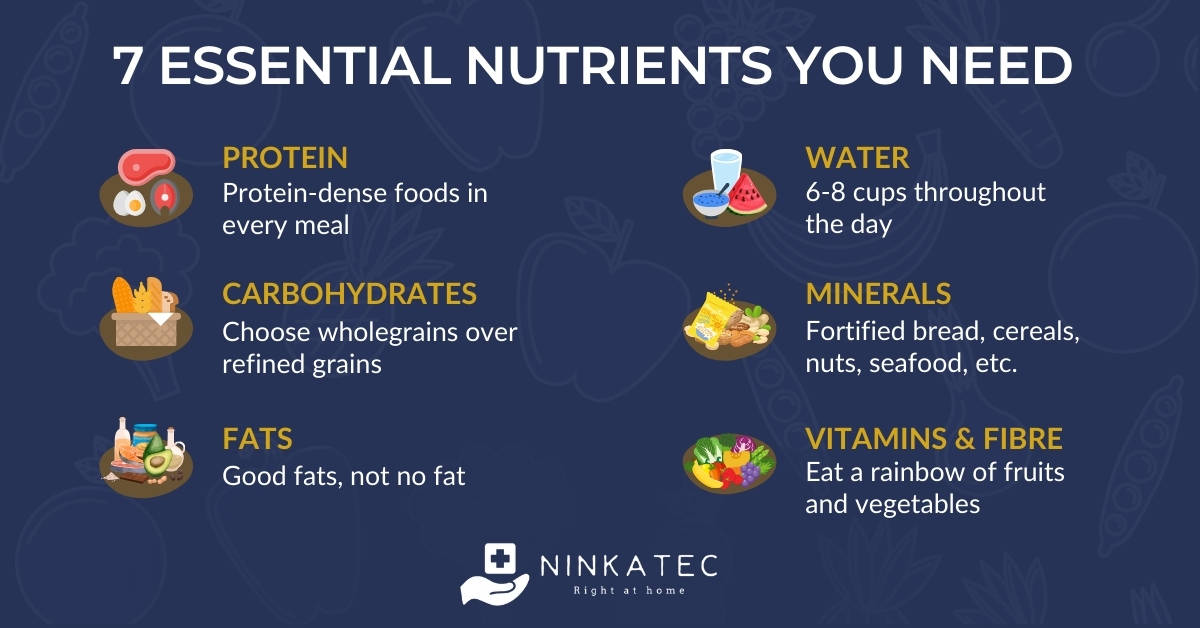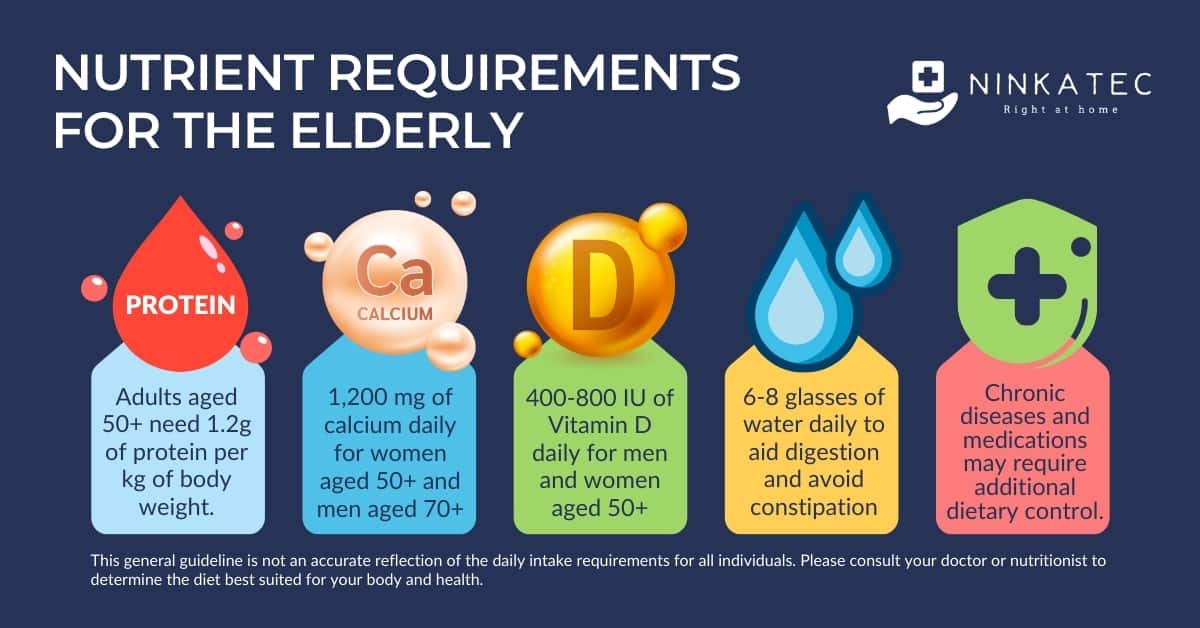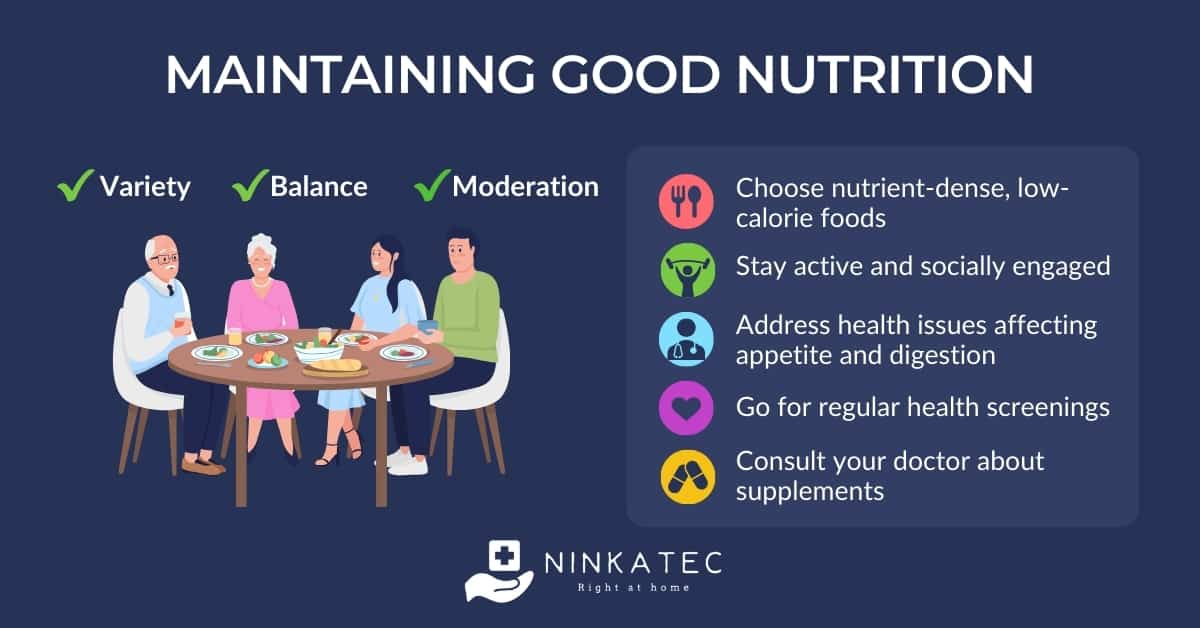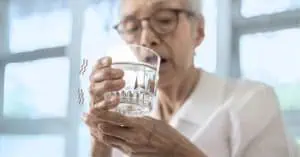‘What should I eat today?’ is one of the most frequent questions we ask ourselves every day. The answers not only satisfy our taste buds but also impact our health. In this article, we discuss important guidelines to answer the question, including how to get good nutrition from our diet at all ages, how to manage common eating difficulties among the elderly, and the appropriate use of supplements.
Table of Contents
Should you eat more or less as you grow older?
With age, there is a natural decline in metabolic rate and physical activity levels. Seniors also tend to have a smaller appetite. We often see our elderly loved ones eat less than us, leading us to think that it is normal to eat less as we age. However, this perception can be misleading.
While it is true that seniors may not consume as many calories as younger adults because of their reduced metabolism, they need more protein to preserve their muscle mass and muscle strength. Insufficient protein intake can lead to muscle loss, frailty, and slower recovery from illness or injury. The elderly also have higher needs for calcium and vitamin D to prevent osteoporosis, for vitamin B12 and potassium to make up for lower absorption of these nutrients that commonly occurs with age.
In short, we need to consume more nutrient-dense but lower-calorie foods as we age. For example, if you have a coffee made from a 3-in-1 instant coffee packet, you get less than 1 gram of protein. But if you drink 250ml of soya milk (1 cup), you can typically get 5 to 6 grams of protein. Among different types of pre-made drinks, low or no-sugar types give you the same amount of protein with fewer calories. Similarly, if you have a bowl of fish ball soup for lunch, you feel full but may not get as much protein as eating two hard boiled eggs.
This is not to say that you should quit instant coffee and fish balls and switch to soya milk and boiled eggs. The key to adequate nutrition is a balanced diet and making conscious food choices daily that meet your nutrition goals.
How much protein do you need per day?
According to the Health Promotion Board (HPB), the recommended daily protein intake is 1.2g per kilogram of body weight for people aged 50 and above, and 0.8g for people aged 18-49 years. To give you an idea, you can get approximately 20-25g of protein from 2 pieces of canned sardine, or a palm size piece of chicken breast (100g of chicken breast without skin), or 1 piece of pressed tofu (200 g of tau kwa).
However, a significant portion of Singaporeans don’t consume enough protein. A 2022 national nutrition survey by HPB shows that one in two adults aged 50 and above in Singapore do not meet the recommended daily protein intake. Among the general population, one in four adults doesn't get sufficient protein daily.
Why are protein-rich foods important?
Proteins play a fundamental role in building and repairing tissues, synthesising enzymes and hormones, and serving as an energy source when necessary. They are essential in maintaining your muscle strength and movement, supporting the body's immune functions and accelerating recovery from illness.
In older adults, protein is crucial to counter the loss of muscle mass, or sarcopenia - a natural phenomenon occurring after the age of 30 and accelerating after the age of 60. Sarcopenia is the reason behind flabby arms and legs in older years, but more importantly, it causes muscle weakness. Weaker muscles make the elderly prone to falls, fractures and injuries. When you fail to meet the body’s protein needs, you unintentionally aid the process of sarcopenia. (We wrote about the prevalence and silent risks of unmanaged sarcopenia here.)
Amino acids are the building blocks of protein, some of which can only be obtained from the food we take. The only way to ensure sufficient intake is to consume protein-rich food daily. Sources of protein include lean meats, poultry, fish, beans and dairy products.
What other nutrients are important?
Seven nutrients are essential for the body to function properly. These include vitamins, minerals, protein, fats, water, dietary fibre and carbohydrates, which are obtained from food. We have discussed protein above, let us now discuss the others.
Vitamins
Vitamins are essential for various metabolic processes in the body. For example, Vitamin C supports the immune system and collagen production. Vitamin D assists with calcium absorption and bone health. B vitamins help you convert food into energy.
Vitamins are categorised into fat-soluble (A, D, E, K) and water-soluble (B and C). Fat-soluble vitamins are absorbed with dietary fat and can be stored in the body’s fatty tissues. Water-soluble vitamins are not stored and excreted in urine, which is why they need regular replenishment through diet.
You can get sufficient vitamins from fruits, vegetables, lean proteins and whole grains. An easy way to ensure you get a variety of vitamins through food is to add ‘colours’ to your fruit and vegetable servings, red bell pepper, purple eggplant, carrot, beetroot, orange, etc. - the more colourful the better.
Minerals
Various physiological functions in the body need minerals. They play a role in maintaining fluid balance, forming structural components of tissues, and participating in nerve and muscle function.
Calcium is the most abundant mineral in the body, it is crucial for our bone health and muscle contractions. Iron, which is needed in smaller amounts, is crucial for the body to make haemoglobin - the protein carrying oxygen via the bloodstream. Sodium and potassium are minerals that help to regulate fluid balance and nerve impulses.
You only need very small amounts of minerals daily, which can be obtained from foods like fortified bread and cereals, meat, fish, nuts, milk and dairy products, fruits and vegetables. Large doses of minerals can cause health problems, e.g., too much iron can cause constipation, too much magnesium can cause diarrhoea.
Fats
Fats have a bad rap, but some fats are vital for the body. Dietary fats provide you with energy, keep the body warm, and support cell growth. Without them, fat-soluble vitamins cannot be absorbed. There are two categories of dietary fats - saturated and unsaturated fats. Unsaturated fats are considered the "good fats".
Omega-3 and Omega-6 fatty acids - two types of unsaturated fats, are essential for brain health and reducing inflammation. You can get them from fatty fish (salmon, mackerel, sardines), nuts (flaxseeds, walnuts, and chia seeds), vegetable oils (sunflower, corn, soybean and flaxseed oils), and some fruits (avocado is a prime source). And here is a piece of good news for durian lovers. Durian contains mostly unsaturated fat. However, it is high in calories, so please enjoy it with moderation!
Fat becomes problematic when it results in too much ‘bad cholesterol’ in your blood, or LDL cholesterol, which mainly comes from saturated fats. High levels of LDL cholesterol can increase your chance of getting heart diseases, stroke, and other problems. The recommended strategy for dietary fat is not ‘No Fat’, but ‘Good Fats’. By limiting foods containing high levels of saturated fats (e.g., fatty meat, processed meat, pastry, etc.), and consuming foods that contain unsaturated fats (e.g., fatty fish, nuts, healthy vegetable oils), you provide the body with what it needs to function while keeping the negative impact in check.
Water
60% of our body is water. It is essential for almost every bodily function. Water supports digestion, helps waste elimination through urine, dissolves and transports nutrients, lubricates joints and regulates electrolytes, among other functions.
The general guide is to consume 2 litres of water per day for the body to function well. This includes water from both foods and drinks, like soup, porridge, ice cream, fruit, vegetable, and of course, beverages and plain water.
You may need to drink more water when you work out or lose water due to situations such as staying in the heat, excessive perspiration or having diarrhoea. Note that although alcohol is a liquid, it is not a replacement for water. In fact, drinking alcohol causes the body to lose water, which means you need to drink extra water to make up for the lost amount.
Not drinking enough water leads to dehydration. This is quite common among the elderly, leading to symptoms such as fatigue, headache, dark colour urine, dry skin and constipation. Mild dehydration can be reversed quickly by drinking more water. However, severe dehydration, which can happen as a result of prolonged vomiting or diarrhoea, must be treated urgently at a hospital, since it can cause kidney and brain damage.
Dietary Fibre
There are two types of dietary fibre - soluble and insoluble fibre. Insoluble fibre, found in whole grains and vegetables, adds bulk to stool and helps us maintain regular bowel movements. Soluble fibre, found in oats and some grains, seeds, legumes, and vegetables, can lower cholesterol levels, supporting heart health and blood sugar control.
The Health Promotion Board recommends a daily fibre intake of 20g for women and 26g for men, which is roughly two servings of fruit and two servings of vegetables per day. You can meet this fibre goal with 1 medium banana in the morning, 1/4 plate of cooked vegetables at lunch, 1 small apple in the afternoon and 100 grams of non-leafy vegetables at dinner.
Carbohydrates
Many people avoid carbohydrates, believing they cause weight gain and diabetes. However, carbohydrates are important for our daily functioning, acting as the primary source of energy for cellular processes and physical activities, particularly for the brain and muscles.
There are different types of carbohydrates and some are good for health. Complex carbohydrates, such as whole grains and starchy vegetables, provide sustained energy. They are not fattening and don’t need to be avoided. Simple carbohydrates, such as sugars and refined grains, are the ‘bad carbs’. They provide quick energy, followed by a ‘crash’. This process often leads to increased hunger, overeating, weight gain, and is associated with higher risks of chronic diseases like diabetes and high blood pressure.
Nutritional requirements for the elderly
The seven essential nutrients above are important for everyone. However, if you are a senior or caregiver caring for an elderly, there are additional nutritional needs specific to the older age group that you need to pay attention to.
Seniors have higher protein needs
Adults above the age of 50 need to consume 1.2g of protein for each kilogram of their body weight, which is 50% higher than younger adults. This is to offset the muscle loss that occurs with ageing. At times of illnesses, you may need to beef it up even more to support recovery and healing. The best way to meet this requirement is to include protein in every meal, including snacks.
Shop for protein-dense foods that fit your diet, e.g., soy-based, chicken and fish-based items. Snacking can be a great way to add protein. Examples of healthy, delicious protein-rich snacks include boiled or steamed edamame, tempeh chips, roasted nuts, protein bars. Exercises, especially strength training, promote protein metabolism - Keep yourself active to make the most of your diet!
Seniors have higher needs for calcium and vitamin D
The loss of bone density occurs naturally with ageing, especially after the age of 50 and among women. Osteopenia occurs when bone loss is higher than usual, putting a person at increased risk of bone fractures. The severe form of osteopenia is called osteoporosis. It is estimated that osteopenia affects one in two women and one in four men above the age of 50 in Singapore.
Dieticians recommend a daily intake of 1,200 mg of calcium for women over 50 years old and men over 70 years old, to maintain bone health. Both men and women also need a higher intake of vitamin D, especially if they are homebound with little sun exposure. Vitamin D supports calcium absorption, immunity and movement. The recommended intake is between 400 and 800 IU of vitamin D daily.
Calcium can be obtained from dairy products, leafy greens, fish with tiny edible bones like canned sardine and salmon, fortified foods, while the best food source of vitamin D is fatty fish.
It is a good idea to get a Bone Mineral Density test if you are over 50 and have a risk factor for osteoporosis. Learn more about osteopenia and osteoporosis risk factors or ask your doctor about them.
Seniors need proper hydration to aid with digestion and avoid constipation
Older adults are often at a higher risk of dehydration. Multiple reasons contribute to this, including hesitation to drink water due to age-related incontinence, decrease in thirst sensation, changes in the water and sodium homeostasis, and medication side effects.
The general guide is to consume 6 to 8 glasses of water regularly throughout the day. You can vary the sources of water with soups, broths, hydrating fruits (e.g., watermelon, orange, melon) and vegetables (e.g., celery, lettuce, zucchini). Plain water can be made 'interesting' by being infused with fruit or herbs (e.g., lemon, berries, mint). It is also a good idea to stock up your fridge with soy milk or low-fat dairy instead of sugary drinks, they supply water as well as additional protein. However, limit caffeinated and alcoholic beverages, they can cause dehydration instead of helping with it.
Certain chronic disease and medications may require additional dietary control
Chronic diseases such as diabetes, high blood pressure, kidney disease, heart disease are more common among people above 60 years old. Managing your diet is often a part of the overall treatment plan.
For instance, carbohydrates control is crucial for diabetics. This requires understanding carbohydrate types and how they are present in different foods, staying away from refined carbs (white bread, rice, sugary drinks, etc.) and choosing good carbs for energy instead (e.g., brown rice, whole grain bread and noodle, vegetables and fruits). Fibre also plays a role in lowering blood sugar levels and the chances of cardiovascular diseases - a comorbidity of diabetes. If you have diabetes or are caring for someone with the condition, make sure you plan your meals with these in mind.
Dealing with appetite and digestive problems
Some of you may be thinking, how to meet the protein and nutrition requirements when I, or my senior loved one, if you are a caregiver reading this, just don’t have the appetite to eat?
To bring back appetite, it is important to find out what causes lack of appetite in your case and address the root cause. Multiple reasons are associated with reduced appetite, including:
- Poor digestion (e.g., constipation, irritable bowel syndrome or inflammatory bowel disease)
- Difficulty swallowing (dysphagia) - they can occur as a result of stroke or dementia
- Difficulty chewing, ill-fitted denture and other dental problems
- Side effects of medications
- An underlying illness or nutritional deficiency
Consult your doctor if loss of appetite prevents you from meeting your nutritional goal, or manifests with other symptoms, such as fatigue, weight loss, nausea, vomiting, abdominal pain, digestive issue or anxiety. They may indicate an underlying medical condition. Learn more about the causes and treatment for lack of appetite in our article here.
Aside from health and medical causes, appetite can also be affected by physical, psychological and social influences. We tend to enjoy a meal better after an effective workout or when we are in good company. So get active, meet friends for teatime, make an effort to gather with your family for dinner as often as possible, not only for occasions. You may be boosting your nutrient intake and improve your bond with loved ones at the same time.
Are supplements always necessary?
There is a belief that if we don’t get enough nutrients from food, we can always get them from supplements. While there is some truth to this statement, it can be misleading and lead to overuse of supplements to counter unhealthy eating and lifestyle choices instead of developing healthy diet habits.
Experts believe that it is possible to get adequate nutrition from our diet, and most healthy people don’t need supplements. However, supplements can be useful if you have a nutritional gap, due to causes such as chronic diseases, recovering from illnesses, or having food allergies or restrictions. In such cases, a doctor is in the best position to advise you what supplements and dosage to take.
The gist of the matter is that supplements are meant to be supplementary, not a substitute for a healthy and nutritious diet. If there are still nutritional gaps, you can tap into well-established supplements like multivitamins to get a nutrient boost, provided you get them from reputable brands and sources. As health supplement products do not need to be approved by the Health Sciences Authority (HSA) for sales in Singapore, it is important to exercise discernment before buying and taking them.
Seniors with chronic conditions need to be extra cautious with supplements, as they may interact with other medications you are taking. When unsure, it is best to ask your doctor for advice.
How to know if I or my senior loved one has nutrient deficiency
Mild nutritional deficiencies may not have any symptoms. In severe cases, symptoms vary depending on the type of nutrient. Calcium deficiency may cause numb or tingling fingers. Lack of potassium may make your muscles feel weak and your heart beat irregularly. Vitamin B12 deficiency - a risk among vegetarians as plants don’t contain the nutrient - may leave you with fatigue and numbness. In many cases, they are not obvious enough for you to notice, or there are no symptoms at all.
Thus, the best way to check for nutritional deficiency is through screening of your general health and common deficiencies you may be at risk of, e.g., a bone mineral density test for women above 50 years old.
“For most people, a full blood profile done during a health screening is sufficient. If the results are normal, you are generally healthy and don’t have any symptoms, there is no need to worry,” advises Dr Choo Dee Pheng, resident GP Doctor at Charazoi Medical Clinic. “However, if you lose weight without intending to, have poor appetite, get cold or flu easily, notice new symptoms such as fatigue, brittle nails, cramped muscle, 'sallow' or yellowish skin, and so on, it is advisable to reach out to your GP or family doctor for an examination.”
Takeaway Message
As an ancient quote goes, ‘Let thy food be thy medicine and medicine be thy food'. Nothing beats the benefits of a healthy and nutrient-dense diet. Achieving this doesn’t require you to track your food to the exact grams of nutrients and calories. The key to healthy and nutritious eating is variety, balance and moderation. It is also helpful to learn to read nutritional information when shopping for groceries and size nutrients accurately by portion to ensure adequate intake.
You don’t need to overhaul your diet or ‘ban’ yourself completely from your guilty pleasure dishes either. Like other lifestyle changes, success comes with small, sustainable habits. Opt for a wholemeal toast with peanut butter instead of white toast with jam today, swap a bag of potato chips for a bowl of bean curd tomorrow. Such daily choices don't cost you additional time or money but will set you on the way to your healthier happier self in the golden years.



